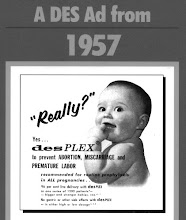
18th January 2010
Outing of DES drug information
For decades Government health information about the dangerous anti-miscarriage drug, DES (diethylstilboestrol) has taken a background position, almost hidden. This drug’s harmful effects aren’t outwardly visible and it has often been called ‘the hidden Thalidomide’. A simple street-survey would show most Australians have never heard of it, let alone know how to say it. There are stated problems with this ‘hidden’ factor for a significant number of the drug’s victims.
The organisation, DES Action NSW has provided an estimate that at least 160,000 Australians have been prescribed DES during pregnancy or exposed to the drug in the womb. The group claims that thousands of Australians are still unknowing victims forty years on since the drug was linked to cancer and remain oblivious to the vital health care they need.
Apart from certain types of cancer, other risks with DES exposure include reproductive abnormalities, miscarriages, ectopic (tubal pregnancies), premature delivery, undescended testes, and infertility. DES was used during pregnancy from 1938-1971 (and sometimes beyond).
The Department of Health and Ageing has refused to inform Australians directly in public health programs about the possibility of having been DES exposed, but assures DES Action it is committed to ensuring appropriate information is provided. Department correspondence to the group states DES exposed women should be encouraged to see their doctor for specific management and surveillance.
“Without direct and ongoing publicity about DES by Government, DES exposed Australians are literally walking time bombs kept in the dark,” says Carol Devine, DES Action group coordinator and herself, a DES daughter. “Australians need to know about DES in the first instance to enable them to seek information about DES and the special preventive health care they need. Not everybody has computer access to find DES information on Department websites and finding out by chance or not at all about a dangerous prescribed drug is not satisfactory.”
A blog site developed by DES Action NSW (www.des.nsw.blogspot.com) includes report that an Australian woman recently won a three-year legal battle in the United States, after taking legal recourse against the makers of anti-miscarriage drug DES (diethylstilbestrol). Exposed to DES in-utero in the 1960’s, she developed the aggressive form of cancer clear cell adenocarcinoma at 21 years old, and was left infertile after a radical hysterectomy. Australian law does not allow legal recourse for DES victims.
This month the group received news from US screenwriter, Caitlin McCarthy about the upcoming feature movie, a scientific drama about DES, “Wonder Drug” (www.wonderdrugthemovie.com)
“Going to the movies to see ‘Wonder Drug’ this year may be the way that Australians find out about DES”, says Devine.
-ENDS-


